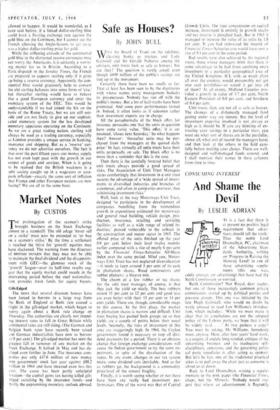Safe as Houses?
By JOHN BULL
wmt the Board of Trade on the sidelines, clearing bank:. as trustees and Lady Gaitskell and Sir Gerald Nabarro among the advisers, unit trusts look as safe as houses: but are they? The question is rarely asked, even though £600 million of the public's savings are tied up in the movement.
Certainly there have been no smells so far. That at least has been seen to by the dignitaries with whose names every management bedecks its prospectuses. Nobody has run off with the public's money. But a lot of half-truths have been promoted. And some poor performances turned in. Indeed, it often looks as if salesmen rather than investment experts are in charge.
All the paraphernalia of the block offer, for instance, persuades one that the units in question have some rarity value. 'This offer,' it is an- nounced, `closes next Saturday.' So what happens then? Answer: `thereafter units may be pur- chased from the managers at the quoted daily price.' In fact, virtually all units trusts have their units perpetually on sale. The block offer is no more than a reminder that this is the case.
Then there is the carefully fostered belief that unit trusts always provide a good spread of risks. The Association of Unit Trust Managers states comfortingly that investment in a unit trust secures the advantage of a 'wide spread of invest- ments in diversified industries and branches of commerce, and often in companies overseas, thus minimising investment risks.'
Well, look at the way Motorways Unit Trust, designed 'to participate in the development of companies benefiting from the tremendous growth in expenditure estimated for motorways and general road building, vehicle design, pro- duction, insurance, retailing and servicing facilities as well as a wide range of related in- dustries,' proved vulnerable to the setback in the construction and motor sector in 1965. The offered price of the units finished up the year 0.9 per cent below their level twelve months earlier compared with a rise of nearly 6 per cent by the Financial Times-Actuaries All-Share index over the same period. Mind you, Motor- ways Unit Trust has not neglected diversification —it tends to keep around 5 per cent of its cash in plantation shares. Road constructors and rubber planters: a bizarre mix.
The charm of a few rubber or tea shares for the unit trust manager, of course, is that they jack the yield up nicely. The best rubbers return 11 per cent to 12 per cent and good teas are even better with their 13 per cent to 14 per cent yields. There are, though, considerable snags to this course. In the first place, the market in plantation shares is narrow and difficult. Unit trust buying has pushed both groups up so that yields are a couple of points below their usual levels. Secondly, the risks of investment in this area are staggeringly high. In 1964, the Ceylon government found it necessary to stop all divi- dend payments for a period. There is an obvious chance that foreign exchange considerations will cause the Indian government to try the same ex- periment, in spite of the devaluation of the rupee. In any event, changes in our tax system make some dividend cuts inevitable. And as far as rubbers go, the background is a commodity price-level of the utmost fragility.
Finally, it is worth seeing whether or not there have been any really bad investment per- formances. One of the worst was that of Capital Growth Units. The trust concentrates on capital increase, investment is entirely in growth stocks and net income is ploughed back. But in 1965 it managed to increase the value of its units by 1.8 per cent. If you had reinvested the income of Financial Times-Actuaries you would have seen a rise of 9.1 per cent in the same period.
Bad results were also achieved by the regional trusts, those whose managers think that there is some advantage to be had from confining one's investment to a particular geographical area of the United Kingdom. ICI, with so much plant all over the country, would presumably not get into such portfolios—or would it get into all of them? .At all events, Midland Counties pro- vided a growth in value of L7 per cent, North Eastern Provident of 0.8 per cent, and Southern of 0.4 per cent.
Unit trusts, then, are not all as safe as houses. The chances of a dishonestly managed fund getting under way are remote. But the level of investment expertise involved is not always as high as it should be. If you are thinking of en- trusting your savings to a particular trust, you must see what sort of shares are in the portfolio; above all, what sort of record the managers have and then look at the others in the field care- fully before making your choice. There are well- designed and well-managed funds around, and I shall mention their names in these columns from time to time.






























 Previous page
Previous page